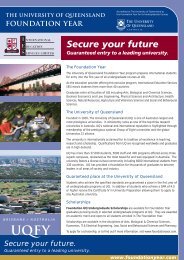UNDERgRADUATE PROSPECTUS - Study Brisbane
UNDERgRADUATE PROSPECTUS - Study Brisbane
UNDERgRADUATE PROSPECTUS - Study Brisbane
- No tags were found...
You also want an ePaper? Increase the reach of your titles
YUMPU automatically turns print PDFs into web optimized ePapers that Google loves.
Science, Geography and Planning<br />
unprecedented discoveries in areas as diverse as<br />
human medicine, agriculture, conservation biology<br />
and biotechnology. The analysis of vast collections<br />
of genomic data has spawned the new discipline of<br />
bioinformatics that has required the development of<br />
new analytical and programming tools. This major<br />
can be taken on its own or in combination with any<br />
other biological major, or with Computer Science.<br />
Geographical Sciences<br />
Geographical science investigates the spatial<br />
patterns of physical and human phenomena at local,<br />
national and global scales. It examines the patterns<br />
and processes of natural and built environments<br />
and human activity, how they change over time<br />
and how they interact. Physical geography looks at<br />
patterns and processes in climate, landforms, soils,<br />
plants, animals and the impact of human activities<br />
on these systems. Human geography examines<br />
how people interact with the environment and about<br />
applying physical geography elements to human<br />
ends. Human geography involves applied studies<br />
in urban and rural settlement, location and landuse,<br />
human spatial behaviour and demography.<br />
Geographical information science is the study of<br />
geographic information systems and remote-sensing<br />
for modelling, managing, analysing and applying<br />
geo-referenced information in a variety of contexts.<br />
It is concerned with the interpretation and analysis of<br />
geographical information obtained from airborne and<br />
satellite images, land surveying, field observation and<br />
data systems. It has applications in earth, biological<br />
and environmental sciences; built environments;<br />
human settlements; planning; and natural resources.<br />
Geological Sciences<br />
Geology is the study of the interacting systems of the<br />
solid Earth, atmosphere, hydrosphere, and biosphere<br />
as they evolve through time. Geologists discover,<br />
develop, and responsibly manage minerals, energy,<br />
and other Earth resources. Geological knowledge<br />
underpins our capacity to ensure a sustainable<br />
supply of natural resources and the use of these<br />
resources responsibly, and it is essential for solving<br />
environmental challenges, such as climate change.<br />
UQ offers a wide range of core courses in geology,<br />
chemistry, mathematics and physics, which provide<br />
a foundation for the study of fundamental geologic<br />
methods and problems, both in the laboratory and<br />
in the field. You may specialise in economic geology,<br />
mining geology, energy resources, geophysics,<br />
environmental geology, geochemistry, palaeobiology,<br />
marine geology, surficial processes and landscape<br />
evolution, tectonics, and remote sensing. Most<br />
students complete advanced courses in field geology,<br />
culminating with a trip to the Mt Isa region. Field and<br />
laboratory-based projects during your honours year<br />
solidify your geologic skills and provide essential<br />
training for independent research.<br />
Marine Science<br />
Marine science is the study of oceans and coastal<br />
habitats, and includes a wide range of disciplines in<br />
the biological, chemical, physical and earth sciences.<br />
You can pursue a general study plan or a more<br />
specialised plan in an area such as marine biology<br />
or marine geology. With an increasing focus on the<br />
role of our oceans to provide food and resources for<br />
our growing populations, the next generation of UQ<br />
marine scientists will play a major role in ensuring<br />
that we protect and profit from our oceans. UQ has<br />
the largest and best marine research facilities of any<br />
Australian university, and the largest assembly of<br />
marine scientists in Queensland. In this major, you<br />
will have an opportunity to undertake studies at the<br />
Moreton Bay Research Station (MBRS), Heron Island<br />
Research Station (HIRS) in the southern Great Barrier<br />
Reef, and the Low Isles Research Station in the far<br />
northern Great Barrier Reef.<br />
Mathematics<br />
Mathematics is one of the most enduring fields of<br />
study, and is essential in an expanding number of<br />
disciplines and professions. Many mathematicians<br />
continue to develop new mathematics for its own<br />
sake. But today mathematicians also combine<br />
their knowledge of mathematics and statistics with<br />
modelling and computational skills, and use the<br />
latest computer technology to solve problems in<br />
the physical and biological sciences, engineering,<br />
information technology, economics, and business.<br />
UQ offers a wide range of courses in mathematics<br />
and its applications. In first-year, you will study<br />
essential topics in calculus, linear algebra and<br />
differential equations. In later years, you can select<br />
from specialised courses, which emphasise new<br />
ideas in mathematics, and include recent applications<br />
in coding and cryptology, mathematical physics,<br />
mathematical biology, bioinformatics and finance.<br />
Microbiology<br />
Microbiology is the study of microscopic living<br />
organisms: bacteria, viruses, fungi, algae and<br />
protozoa. These organisms have a major impact<br />
on all aspects of life. Diseases caused by microbes<br />
are well known and can involve viruses (e.g.,<br />
influenza and HIV), bacteria (e.g., meningococcus,<br />
staphylococcus, E. coli) and protozoa (e.g.,<br />
malaria). Our understanding of these organisms<br />
is directly linked to the control and prevention of<br />
infectious diseases. Immunology plays a key role in<br />
understanding how humans and animals respond to<br />
the challenge of these disease-causing organisms.<br />
In recent years, research in microbiology has been<br />
revolutionised by new and exciting technologies,<br />
such as proteomics, genomics, bioinformatics and<br />
genetic engineering. Thus, Microbiology is a discipline<br />
of enormous importance in basic and applied<br />
science.<br />
Physics<br />
Physics is one of the fundamental sciences, and<br />
involves solving the big questions that have always<br />
intrigued humankind: where did we come from<br />
and where are we headed? Physics embraces the<br />
study of the most basic natural laws, and is about<br />
explaining how and why things work on scales<br />
ranging from the sub-nuclear, through the everyday,<br />
and on to the entire cosmos. Physicists explore and<br />
identify basic principles governing the structure and<br />
behaviour of matter, the generation and transfer of<br />
energy, and the interaction of matter and energy.<br />
Some physicists use these principles in theoretical<br />
or experimental studies on topics such as the<br />
nature of time and the origin of the universe, while<br />
others apply their physics knowledge to practical<br />
areas, developing advanced materials, electronic<br />
and optical devices, and equipment for a wide<br />
range of fields such as medicine, mining, astronomy<br />
and geophysics. Physics is also at the heart of<br />
new interdisciplinary areas such as information<br />
technology, nanotechnology, quantum technology<br />
and biophotonics. In newly developing areas in the<br />
biosciences, an understanding of basic physical<br />
principles is one of the keys to advancing knowledge.<br />
Plant Science<br />
Think about two of the most important problems<br />
facing humankind: global warming and dependency<br />
on fossil fuels. Using a variety of approaches,<br />
plant scientists are addressing both problems –<br />
from the production of biofuels from plant origin<br />
to the use of plants in carbon sequestration.<br />
Animals and humans depend utterly on plants,<br />
and not only for food. Today, plant science has<br />
demolished the classic barriers of being confined<br />
to farm and food production. With the advent of<br />
modern biotechnology, plants are being used to<br />
decontaminate land and air, and to produce industrial<br />
products, designer molecules, biopharmaceuticals<br />
and energy (biofuels). In addition, designer plants<br />
are producing biodegradable plastics, new healthier<br />
sugars, and anti-cancer drugs. Plant scientists need<br />
to understand how plants work, from molecules<br />
to ecosystems to improve the production of food,<br />
pharmaceuticals and timber, to control diseases,<br />
pests and noxious weeds, to allow them to cope with<br />
drought, salinity and pollutants, and to design new<br />
plants for innovative purposes, such as biofactories.<br />
Psychology<br />
Psychology is the scientific study of how people<br />
behave, think and feel. It is a broad ranging discipline<br />
that spans topics including brain function, memory,<br />
conscious experience, lifespan development, social<br />
behaviour, and the full spectrum of functional and<br />
dysfunctional behaviour. In this major, you will gain<br />
an understanding of how to apply the scientific<br />
perspective to psychological phenomena in the<br />
laboratory and in the real world.<br />
Statistics<br />
Statistics is an essential part of science, providing the<br />
mathematical language and techniques necessary<br />
for understanding and dealing with chance and<br />
uncertainty in nature. Statistics involves designing,<br />
collecting, analysing and interpreting numerical<br />
data, with the aim of extracting patterns and other<br />
useful information. Examples include the analysis<br />
of DNA and protein sequences, the construction<br />
of evolutionary trees from genetic data, the<br />
improvement of medical treatments via experimental<br />
designs, and the assessment of drought conditions<br />
through meteorological data. A main feature of<br />
statistics is the development and use of statistical<br />
and probabilistic models for random phenomena,<br />
which can be analysed and used to make principled<br />
predictions and decisions. Examples of such models<br />
can be found in biology (genetics, population<br />
modelling), finance (stock market fluctuations,<br />
insurance claims), physics (quantum mechanics/<br />
computing), medicine (epidemiology, spread of HIV/<br />
AIDS), telecommunications (Internet traffic, mobile<br />
phone calls), and reliability (safety of oil rigs, aircraft<br />
failure), to name but a few.<br />
Zoology<br />
Zoology is a branch of biology that deals with the<br />
scientific study of animals. Fundamental to this<br />
science is an understanding of animal evolution<br />
and diversity, gained through research into aspects<br />
of the morphology, development and genetics,<br />
behaviour, ecology, physiology, biochemistry and<br />
molecular biology of animals. Zoologists explore the<br />
relationships and interactions of animals with their<br />
physical and biological environments at individual,<br />
population, community and ecosystem levels, and<br />
use contemporary comparative and experimental<br />
approaches to investigate the evolution and diversity<br />
of animals. The study of Australia’s unique fauna<br />
provides exciting and rewarding opportunities for<br />
zoologists to understand and appreciate animal life.<br />
If you are seeking qualifications as a professional<br />
zoologist, you will be guided in selecting<br />
combinations of courses that lead to training in the<br />
specialisations of wildlife and conservation biology,<br />
entomology, environmental physiology, marine<br />
biology, fisheries biology and aquaculture, terrestrial<br />
ecology, molecular ecology, and mathematical<br />
applications in biology. Field courses are offered in<br />
arid zone ecology, rainforest ecology, marine ecology,<br />
and coral reef biology.<br />
Career opportunities<br />
Scientist in a wide array of industries, both science<br />
and non-science, depending upon specialisation.<br />
Dual degree programs<br />
– Arts<br />
– Business Management<br />
– Commerce<br />
– Engineering<br />
– Economics<br />
– Education (Secondary)<br />
– Information Technology<br />
– Journalism<br />
– Laws<br />
– Medicine, Surgery<br />
Additional cost<br />
Courses that include a field trip component may incur<br />
additional costs to cover transport, accommodation<br />
and food.<br />
International contact details<br />
International Student Advisor<br />
Online: www.uq.edu.au/international/enquiry<br />
Phone: within Australia (free call): 1800 671 980<br />
Outside Australia: +61 3 8676 7004<br />
UNDERGRADUATE <strong>PROSPECTUS</strong> FOR INTERNATIONAL STUDENTS 2012<br />
63

















